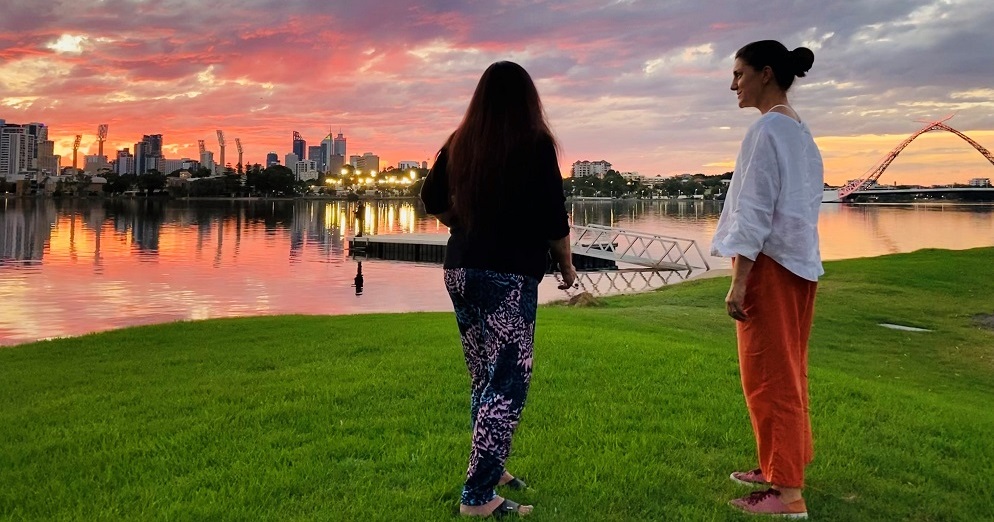Despite Indigenous Australians facing nearly twice the risk of dying from cardiovascular disease compared to non-Indigenous Australians, most heart health messaging for Aboriginal communities is scripted in mainstream English, missing the mark on cultural relevance.
An innovative collaboration between Chair of Linguistics and Director of the Language Lab at UWA Dr Celeste Rodríguez Louro and respected Nyungar educator and writer Glenys Collard is working to change that.

Image: Ms Glenys Collard and Dr Celeste Rodriguez Louro discuss their work with the Heart Foundation by the Derbarl Yerrigan (Swan River).
In partnership with the Heart Foundation, the language experts have crafted two powerful heart health videos, fully scripted in Aboriginal English, in a whole new approach to First Nations-based health marketing campaigns.
Dr Rodríguez Louro says the initiative, born out of a shared passion for culturally safe communication, represents a significant step in decolonising medical media.
The videos use the traditional First Nations’ practice of yarning, a culturally rich form of storytelling and conversation, presenting vital health information in a way that may resonate with Aboriginal and Torres Strait Islander communities,” she explains.
Yarning isn’t just talking; it’s a really powerful conduit for knowledge transfer, especially in the context of health. For us it was key to ensuring that the medical messages weren’t just heard, but ideally also understood and valued in these communities.”
For Ms Collard, every aspect of what the videos portrayed was important, from the fact that the setting for the animated characters was largely outside, to the work of Nyungar actor Kelton Pell for the voice overs.

Image: Ms Glenys Collard with Nyungar actor Kelton Pell.
He (Kelton) knew what we were talking about, the way we talk at home to our mob,” Ms Collard says.
He understood what reading this yarn was, it was just us talking.”
The success of the project, which is captured in detail in the newly released Routledge volume, Language and Decolonisation: New Interdisciplinary Conversations, is reflected in its reach and reception.
The first video, released in 2020, attracted more than 13,000 views on YouTube, with the second video continuing the momentum. Beyond the online space, state-of-the-art video brochures were distributed to remote communities, so that those without internet access would also benefit.
Our collaboration is a great example of how linguistic research and First Nations-led initiatives can intersect to create impactful, community-oriented resources,” Dr Rodríguez Louro says.
It not only showcases the potential of Aboriginal English as a medium for important health messages but also highlights the broader role of language in decolonisation efforts.”
Dr Rodríguez Louro and Ms Collard say they will continue to challenge the status quo to pave the way for more inclusive and culturally relevant approaches in medical media to ensure the voices of First Nations people aren’t just included but are at the forefront of the conversation.
We have to work together, it’s about teaching each other,” Ms Collard says.
Their next project involves making voice-operated technology, like the ones used on mobile phones, more inclusive for speakers of Aboriginal English. Stay tuned!
Read the full issue of the Summer 2024 edition of Uniview [Accessible PDF 12MB].
